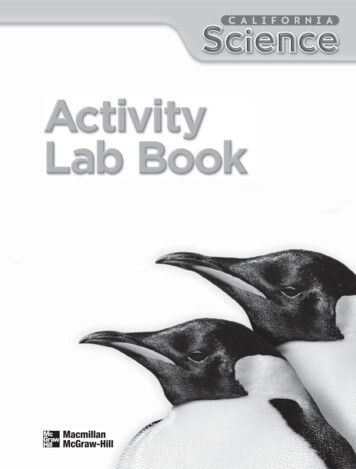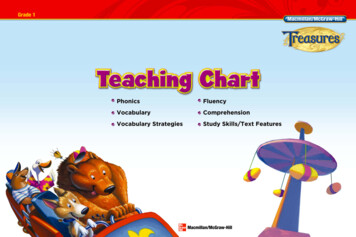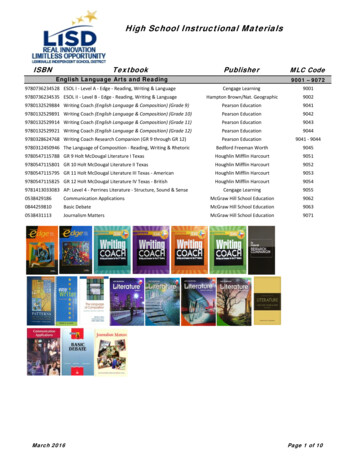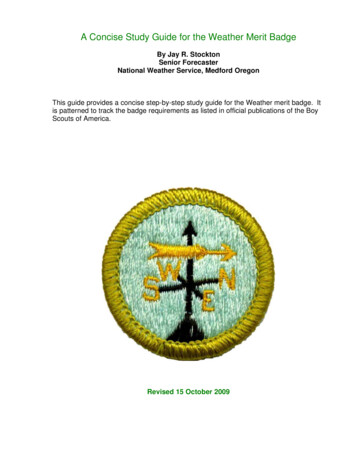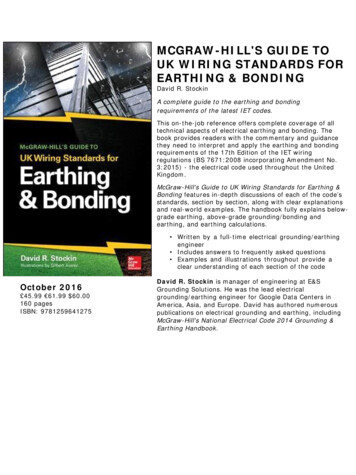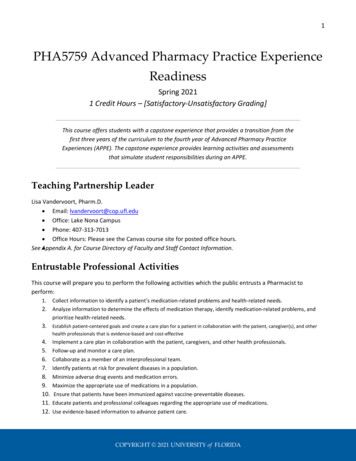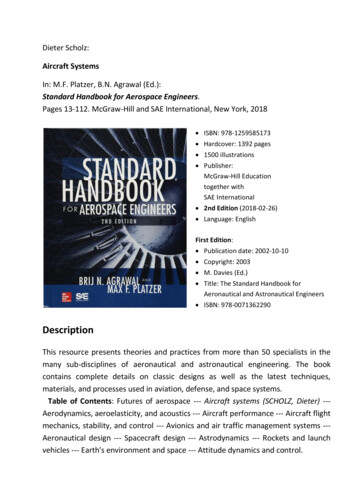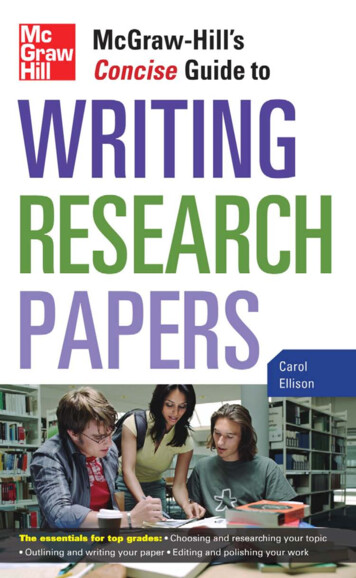
Transcription
McGraw-Hill’s ConciseGuide to WritingResearch Papers
This page intentionally left blank
McGraw-Hill’s ConciseGuide to WritingResearch PapersCarol EllisonNew York Chicago San Francisco LisbonLondon Madrid Mexico City Milan New DelhiSan Juan Seoul Singapore Sydney Toronto
Copyright 2010 by The McGraw-Hill Companies. All rights reserved. Except as permitted under theUnited States Copyright Act of 1976, no part of this publication may be reproduced or distributed in anyform or by any means, or stored in a database or retrieval system, without the prior written permissionof the publisher.ISBN: 978-0-07-162990-4MHID: 0-07-162990-4The material in this eBook also appears in the print version of this title: ISBN: 978-0-07-162989-8,MHID: 0-07-162989-0.All trademarks are trademarks of their respective owners. Rather than put a trademark symbol after everyoccurrence of a trademarked name, we use names in an editorial fashion only, and to the benefit of thetrademark owner, with no intention of infringement of the trademark. Where such designations appear inthis book, they have been printed with initial caps.McGraw-Hill eBooks are available at special quantity discounts to use as premiums and salespromotions, or for use in corporate training programs. To contact a representative please e-mail us atbulksales@mcgraw-hill.com.This publication is designed to provide accurate and authoritative information in regard to the subjectmatter covered. It is sold with the understanding that neither the author nor the publisher is engaged inrendering legal, accounting, or other professional services. If legal advice or other expert assistance isrequired, the services of a competent professional person should be sought.—From a Declaration of Principles jointly adopted by a committee of the American Bar Association anda Committee of Publishers.TERMS OF USEThis is a copyrighted work and The McGraw-Hill Companies, Inc. (“McGraw-Hill”) and its licensorsreserve all rights in and to the work. Use of this work is subject to these terms. Except as permitted underthe Copyright Act of 1976 and the right to store and retrieve one copy of the work, you may notdecompile, disassemble, reverse engineer, reproduce, modify, create derivative works based upon,transmit, distribute, disseminate, sell, publish or sublicense the work or any part of it without McGrawHill’s prior consent. You may use the work for your own noncommercial and personal use; any other useof the work is strictly prohibited. Your right to use the work may be terminated if you fail to comply withthese terms.THE WORK IS PROVIDED “AS IS.” McGRAW-HILL AND ITS LICENSORS MAKE NO GUARANTEES OR WARRANTIES AS TO THE ACCURACY, ADEQUACY OR COMPLETENESS OF ORRESULTS TO BE OBTAINED FROM USING THE WORK, INCLUDING ANY INFORMATIONTHAT CAN BE ACCESSED THROUGH THE WORK VIA HYPERLINK OR OTHERWISE, ANDEXPRESSLY DISCLAIM ANY WARRANTY, EXPRESS OR IMPLIED, INCLUDING BUT NOTLIMITED TO IMPLIED WARRANTIES OF MERCHANTABILITY OR FITNESS FOR A PARTICULAR PURPOSE. McGraw-Hill and its licensors do not warrant or guarantee that the functions containedin the work will meet your requirements or that its operation will be uninterrupted or error free. NeitherMcGraw-Hill nor its licensors shall be liable to you or anyone else for any inaccuracy, error or omission,regardless of cause, in the work or for any damages resulting therefrom. McGraw-Hill has noresponsibility for the content of any information accessed through the work. Under no circumstancesshall McGraw-Hill and/or its licensors be liable for any indirect, incidental, special, punitive, consequential or similar damages that result from the use of or inability to use the work, even if any of them hasbeen advised of the possibility of such damages. This limitation of liability shall apply to any claim orcause whatsoever whether such claim or cause arises in contract, tort or otherwise.
ContentsPrefaceixChapter 1: Getting Started1Interpreting the Assignment 2Types of Assignments 7Choosing a Research Topic 10Developing a Working Thesis 14Analyzing Your Audience 16Writing a Proposal 17Chapter 2: Doing Your Research19Searching the Internet 20Using Library and Database Resources 25Finding Books at the Library 26Using Library Catalogs 30Browsing for Information 32Looking up Articles in Periodicals 34Identifying Appropriate Sources 38Identifying Reputable Online Sources 40Identifying Reputable Print Sources 44Reading Critically 45v
ContentsDocumenting Your Research 49Narrowing (or Expanding) Your Search 53Writing Annotated Bibliographies 55Conducting Original Research 57Surveys 59Interviews 64Chapter 3: Crafting Your Outline71Making Lists 74Making Charts 75Creating an Outline 78Identifying a Thesis 79Identifying Topics and Arguments 82Outlining a Five-Paragraph Paper 84Expanding beyond Five Paragraphs 88Comparing and Contrasting Ideas and InformationChapter 4: Preparing Your Draft93Introductions 94Paragraphs 104Writing Topic Sentences 108Adding Evidence 109Writing Transition Sentences 110Conclusions 116Chapter 5: Revising Your WorkAvoiding Plagiarism 122Protecting Yourself against Plagiarismvi12312189
ContentsChoosing a Documentation Style 124Quotations/Citations 129Summaries/Paraphrases 133Bibliographies/Works Cited 136Avoiding Bias 140Chapter 6: Polishing Your Writing145Vocabulary 146Checking Your Usage 148Avoiding the “I”Trap 152Polishing the Prose 153Words 158Chapter 7: Preparing Your Submission161Pictures/Graphics 162The Final Checklist 163Chapter 8: Getting Ready for theNext Time 165Interpreting Feedback 165Keeping a Portfolio 166Appendix A — The Dewey DecimalSystem 169Appendix B — The Library of CongressClassification System 175About the Author189vii
This page intentionally left blank
Prefacehat is a “perfect” research paper? For students, theperfect research paper is the one that earns an A,wins an academic competition, or earns them ascholarly award. For others tasked with writing research papers,the “perfect” paper may be one that earns them a raise or promotion or recognition within their company or the industry inwhich they work.The strategies and tips in this book are written primarily forstudents at the high school and university level. However, theywill be helpful to anyone who is confronted with the task ofwriting a research paper and is looking for help.The good news here is that anyone can learn to write aresearch paper. You do not need to be a “born writer.” Unlikecreative writing where quality is largely a function of imagination, the expository writing done for research papers is basedon standard formats, expectations, and stylistic guidelines thatanyone can follow.Still, writing an effective research paper can be a dauntingtask.While a research paper does not rely heavily on the writer’sinspiration, it does require persistence, attention to detail, and awillingness to read, revise, and perfect what was written—manytimes if necessary. But is that so very different from any otherWix
Prefaceskill that is important in our lives? Remember falling again andagain until you learned to ride a two-wheel bike, missing theball over and over until you learned to bat, or making the mosthorrendous noises on the piano until you properly struck achord? Expository writing is a lot like that. We learn by doing,and we get better with practice. Improvement depends uponthe guidance we get along the way. This book is designed todeliver that.x
McGraw-Hill’s ConciseGuide to WritingResearch Papers
This page intentionally left blank
Chapter 1Getting Startedesearch papers begin with a writing assignment. It maybe specific. It may be general. It may assign you a topicand point you in the direction the research should take.Or it may offer a great deal of flexibility, allowing you to pickyour topic and stage your own investigation. It serves as aroadmap to what you must do. It is your first clue to what yourinstructor expects of you. If you have a thorough understandingof what is expected of you, you will be better able to deliver it.Tackling a research project is, in many ways, like preparingto run a race. You have no hope of finishing among the leadersif you have no idea where the finishing line is or how to getthere. That may sound sophomoric but the vast majority ofresearch projects that end in failure do so because the writerproceeded with no clear idea of what was expected and delivered something off the mark.The first step you take in tackling the paper should pointyou in the direction of a successful finish. You need to knowwhat is expected of you and how to prepare to deliver it. Byunderstanding where you need to end up, you will spare yourself a lot of trial and error in getting there.R1
McGraw-Hill’s Concise Guide to Writing Research PapersFirst Steps Identify the expectations (due date, length, etc.). Interpret the assignment. Analyze the audience. Choose a topic. Write a working thesis. Write a proposal.Interpreting the AssignmentKnowing precisely what you need to produce is the first step toproducing a perfect paper. Not only will it spare you the frustration of assembling material that may not be appropriate tothe assignment, but it will assure you of a better grade. One ofthe first questions on an instructor’s mind is: Did this studentunderstand the assignment? A student’s ability to deliver whatthe assignment requests shows the teacher or professor thatthe student possesses the skills to properly interpret instructions and identify expectations.Research papers typically begin with an assignment thatidentifies your teacher’s expectations and provides the information you need to know to complete the assignment.What You Should Know before You Start2 What is the purpose of the assignment? What does yourinstructor expect you to learn? Is there an assigned topic? Can you choose your own? What kinds of sources should you use? How many sources should you use?
Getting Started Are print and online sources equally acceptable? When is the paper due? How long should it be? How should the paper be formatted? How should bibliographic information be presented? What are the qualities of a paper that gets an A, B, C, or D?You cannot produce a perfect paper if you do not knowwhat “perfection”means to your teacher or the person who willbe reading and evaluating it. More important than the basicexpectations are those that actually tell you what to do. Assignments are often worded very deliberately to test how well students read, interpret, and respond to the expectations that areoutlined. Your instructor may want to know how well you cansummarize new ideas and complex material, for instance, orwhether you can present a logical argument to support anopinion or advocate an idea. Another assignment might spellout how you should conduct your research by specifying thetypes of sources you should consult. Others may use words likeanalyze, discuss, or investigate to describe what is expected. Donot take these words lightly. They have specific meanings.Learn to recognize the learning goals in an assignment.When you receive an assignment, read it thoroughly andbe prepared to ask your instructor about anything that isunclear to you. Make a list of the stated expectations. True, youalready have these on the assignment sheet but writing themdown will emphasize them in your mind and help you toremember them. If you receive the criteria for how your paperwill be graded, examine them as closely as you do the assignment to determine what you must do to achieve the grade you3
McGraw-Hill’s Concise Guide to Writing Research Paperswant. If your teacher does not provide the grading criteria, askwhat they are. An example of grading criteria that we use forwriting composition classes at Rutgers University Newark campus appears below:Grade CriteriaGrade of A: An essay that merits an A demonstrates agenerally high degree of competence and control oflanguage. Typically, such an essay meets all of thefollowing criteria: Responds to the assignment thoroughly, thoughtfully, andwith insight or originality. Demonstrates strong reading comprehension of theassigned texts. Is well-developed and supports analysis with effectivetextual evidence, reasons, examples, and details. Is well-focused and well-organized, demonstratingstrong control over the conventions of analyticalwriting. Demonstrates facility with language, using effectivevocabulary and sentence variety. Demonstrates strong control of grammar, the rules ofusage, and mechanics of standard English but may haveminor errors.Grade of B: An essay that receives a B is written in a clearlycompetent manner and displays generally consistentcontrol of language. Typically, such an essay meets all ofthe following criteria:4
Getting Started Responds to all elements of the assignment competentlyand thoughtfully. Demonstrates an adequate understanding of thereadings. Is adequately developed, using appropriate textualevidences, reasons, examples, and details. Is focused and effectively organized, demonstratingcontrol of the conventions of analytical essay writing. Demonstrates strong language competence and usesappropriate vocabulary and sentence variety. Shows good control of grammar, the rules of usage, andmechanics of standard English, although it may havesome errors and minor lapses in quality.Grade of C: An essay that earns a grade of C demonstratessome competence but is limited in one or more of thefollowing ways: Does not address all parts of the writing assignment. Does not demonstrate an adequate understanding of thereadings. Is thinly developed, often relying on assertions with littletextual evidence or few relevant reasons, examples, anddetails. Is adequately focused and/or adequately organized, butconnections between the parts could be more explicit. Demonstrates limited facility with language and minimalsentence variety. Demonstrates inconsistent control of grammar, usage, andthe mechanics of writing.5
McGraw-Hill’s Concise Guide to Writing Research PapersGrade of D: An essay receives a grade of D if it has one ormore of the following flaws: Is unclear and/or seriously limited in its response to thewriting assignment. Demonstrates a limited reading or misreading ofthe texts. Is unfocused and/or disorganized, demonstratinglittle control of the conventions of analytical essaywriting. Demonstrates serious errors in the use of language, whichmay interfere with meaning. Demonstrates serious errors in grammar, usage, andmechanics, which may interfere with meaning.Grade of F: An essay receives a grade of F when it: Demonstrates little or no ability to develop an organizedresponse to the writing assignment. Contains severe writing errors that persistently obscuremeaning.Make note of any specific information or ideas that theassignment asks you to discuss. It helps to raise your hand, askany questions you may have, and take notes. Any informationyou receive will help you in your pursuit of the “perfect”paper.Make every effort to ensure that you understand whatyour instructor is requesting. That way, you know what todeliver.6
Getting StartedTypes of AssignmentsWriting assignments are not created equal. The approach youtake to receive an A in an assignment for one class will not necessary work well for you in another. You should expect that anywriting assignment, whether it is given at the high school or college level, will differ according to the class you are taking andexpectations your instructor outlines for the class. Even within aclass, an instructor’s expectations are likely to change fromassignment to assignment. Getting a good grade is not a function of “psyching out” your instructor. It is a function of understanding the assignment and what you are being asked to do.The High School LevelIn high school, research papers are generally assigned to test astudent’s ability to look up information and explain it adequately in his or her own words. Here is a list of the kinds ofassignments typically given in high school and what they mean: Summary: An abbreviated account of a larger article, book,or other work.Examples: Book report, movie review, or a summary ofsomething you read in the news or saw on TV. Description: A detailed account of what things look like.Descriptions that help readers “see” what you are talkingabout are especially useful to clarify events, conditions, orconcepts that might be unfamiliar to the reader. Gooddescriptions make appropriate use of adjectives andadverbs, metaphors, similes, and examples to buildreaders’ understanding.7
McGraw-Hill’s Concise Guide to Writing Research PapersExamples: A history report about life in another time or ageography report about the culture and industries inanother country. Explanation: A description that tells why certain conditionsexist or certain events occur. Explanations attempt toidentify the cause or causes that create an effect.Theyattempt to answer the question,“Why”?Examples: A science report. Process: A description of conditions that must exist andactions that must be taken to produce an outcome.Examples: Instructions someone should follow to dosomething successfully, such as following the steps inan experiment, or directions to a destination. Narrative: A story about something that happened.Narratives are often told in chronological order with abeginning, middle, and end.Examples:“What I Did on My Summer Vacation”The University LevelAt the university, a great deal more is expected. Assignmentsbecome more complex. Instead of simply asking you to summarize or describe something, the assignment typically willpresent you with a challenge. Often, too, the assignment is noteven called an “assignment.” Instead, it is called a “writingprompt,” meaning that the purpose of the assignment is to“prompt” your thinking and elicit a thorough written responsefrom you. Writing prompts usually call upon the writer to use acombination of the approaches learned in high school (thoselisted above), as well as employ other approaches and strategies8
Getting Startedto advance new ideas, opinions, and arguments about the topicunder discussion.The path to producing a perfect paper begins with understanding what those goals are and how to identify them in theassignment. Below is a list of terms that professors often use inwriting prompts and what they mean: Analyze relationships among facts, trends, theories, andissues. Point out their significant likes and differences andtell why they are meaningful. Argue in defense of (or against) a concept, opinion,position, thesis, or point of view. Strong arguments applylogic and point out fallacies, errors, and “fuzzy” thinking. Categorize or classify items, concepts, or events by sortingthem in sets of predefined qualities or conditionsaccording to their similarities. Compare and contrast two or more events, ideas, oropinions by identifying their similarities and/ordifferences. (Look for similarities when you compare twothings; look for differences when you contrast them.) Define the meaning of an unfamiliar term, phrase, orconcept by describing the concept behind it. Discuss the implications of your research or various pointsof view on your topic by looking at different sides of theissue and pointing out their merits. Examine a topic in minute detail by describing it as if itwere under a microscope. Illustrate a concept by using many significant details todescribe it.9
McGraw-Hill’s Concise Guide to Writing Research Papers Interpret a set of facts or events by explaining theirsignificance and importance to your reader, or to otheraudiences with other needs or interests. Give your opinion by telling what you think about thetopic and provide an explanation about why youthink it. Reason (the verb, not the noun) by presenting the logicalthought process required to support a specific conclusion. Synthesize information from a variety of sources tosupport a single thesis, opinion, or conclusion. Theorize by presenting your own hypothesis, or bestguess, about why things are the way they are.Choosing a Research TopicTopics for some research papers will be assigned to you, alongwith very specific requirements that you must follow in completing the paper. Others allow you to choose the topic you willresearch.Many assignments are deliberately open-ended, allowingstudents to pick their own topics and pursue their ownresearch. If your assignment is open-ended, you will have lots oflatitude to research a topic that interests you, based on whatever guidelines or parameters your instructor specifies. Thechallenge then becomes finding a topic and devising a thesisand arguments to support it.Below is an example of an open-ended writing assignmentfrom a freshman composition course. It is designed to determinehow effectively students can identify and control a topic, construct their own thesis, find appropriate research to support the10
Getting Startedthesis, and use that research to present arguments their audience would find convincing.Example assignment:Pick an issue that interests you and find at least three newspaper articles or editorials from different sources that expressdiffering points of view on the issue. Produce a five-page paper,including four pages plus a Works Cited page, that analyzes thevarious points of view. What appears to be the best course ofaction, based on the merits of the arguments that the articlespresent? Be sure to use arguments from each of your sources asyou explore the issue. Paraphrase, summarize, and quote themaccurately and be sure to cite them according to MLA style.Open-ended assignments can be fun. They allow you topursue your own interests but they can also be frustratingbecause they require you to make decisions that specificassignments make for you. Students often lament,“I don’t knowwhat to write about,” or they spend a great deal of time gathering research on vague topics that do not address their thesis.The job becomes much easier if you have a topic, one thatis specific and focused and offers something to say. Coming upwith one is the challenge but it is not as difficult as it sounds.Most of us know more—a lot more—than we think weknow about the world around us and the subjects we study inschool. At a minimum, we all hold opinions about what is happening in our world, and, whether we realize it or not, weformed those opinions based on information and experiencewe gathered somewhere in life. If you find yourself stuck for atopic, ask yourself a few questions to get your creative juicesflowing. You will find you have a lot more to say about topicsthat you are involved with or that pique your interest than topics others might suggest.11
McGraw-Hill’s Concise Guide to Writing Research PapersHere are some things to consider when choosing aresearch topic: Your hobbies and special interests.Class discussions that caught your attention and arousedyour interest. Things you have read that caught your attention andaroused your interest. True stories you have heard about on the radio or saw onTV that provoked a reaction from you and made youhappy, sad, angry, or disgusted. Things you have overheard that you would like to knowmore about. Your hopes for the future.Your worries about the future.Things you dream about.Issues you think someone should do something about. Make a list of everything that comes to mind. You can usethis list to begin brainstorming. Behind each topic, write a sentence or two about why it interests you. Do not correct or editwhat you have written. Just write whatever comes to you.When you have finished the list, pick the topic that mostinterests you—one that you actually want to write about andthat you feel you would have a lot to say about. Open-endedresearch papers tend to be large, even massive, projects.They are often assigned weeks ahead of when they aredue in order to give you plenty of time to find material tosupport your arguments. Since you are going to be livingwith the topic for a while, it might as well be something youcare about.12
Getting StartedAfter you have picked a topic, begin to focus it by writingdown anything you can think about the topic you chose.Thingsto consider as you narrow your topic: Your opinion about it. Interesting things you have heard about it. Things you have read about it. Others’ observations on it. Any facts, assumptions, rumors, myths, and even themisimpressions and false representations you have heardabout it.If you are assigned a research topic, you do not have a lotof flexibility. The assignment that appears below is from a college freshman-level composition course. It requires studentsto refer to the readings assigned in class, develop a centralidea (or thesis), and find arguments to support it. Assignmentssuch as this are designed to determine how well studentsunderstand certain readings and how well they can representtheir understanding to others.Example assignment:The ability of music to help people rise above difficult circumstances is a key theme in Oliver Sacks’ book, Musicophilia.Discuss how that affects the lives and mindsets of the two maincharacters in James Baldwin’s short story,“Sonny’s Blues.”If the assignment requires you to write about a specifictopic, write about it. A word to the wise is important here. Neverstray from an assignment and head off in a direction all yourown unless you first get approval from your instructor.One of the best ways to ensure a less-than-perfect grade isto research a topic that in no way resembles the one you were13
McGraw-Hill’s Concise Guide to Writing Research Papersassigned. No matter how brilliant your research or how lovelyyour prose, you will most likely receive an F if you fail to deliverwhat the assignment requests.As noted earlier, instructors usually construct assignmentswith learning goals in mind. A student’s failure to correctlyrespond to an assignment means that he or she has not metthose goals.Worse, it raises a red flag to the instructor who mayquestion whether the student understood the assignment or,worse, whether the student got lazy and desperate and founda well-written essay on the Internet and decided to submit itinstead.If you want to investigate a topic that was not assigned, askyour instructor if you can. Often, an instructor will be happy tolet you follow your passion and conduct your own research, butalways ask permission before you do.Developing a Working ThesisA thesis is a claim that you intend to prove using sound, wellreasoned arguments drawn from careful research. It will be thecentral statement in your paper when you actually sit down towrite. In all likelihood, your working thesis will not be the onethat you actually present in your paper.A working thesis simply aims to get you started on yourresearch.You need it as an idea to guide you.Writing instructorsoften refer to this process of developing an idea into a workingthesis as “invention.” You are “inventing” ideas for your paper.When you have finished this invention stage, you will find thatyou have the basis for a thesis and a good sense of direction inidentifying the research you will need to support it.14
Getting StartedThe working thesis should be aimed at helping you narrowand manage your topic. A working thesis that is phrased in theform of a question can help guide your research. A good working thesis makes the job more manageable. Keep it focused.Avoid making it too general. Theses that are too general oftenramble and result in papers that lose focus and therefore earnlow grades.Here are some examples of questions for working thesesthat are general and not well focused: Should more money be spent on education? How can the government balance the budget? Why should we study art? What should we do about global warming? How can we eliminate poverty? How should we respond to the energy crisis?The following examples, however, are focused on specificissues that can be more easily researched: Should more government-backed student loans be madeavailable? Should cuts in military spending be enacted beforecutting domestic spending to balance the nationalbudget? Should the study of art history or the creative arts receivegreater emphasis in America’s high schools? Is wind energy a viable alternative to fossil fuels? Will the extension of unemployment benefits improve lifefor the nation’s unemployed?15
McGraw-Hill’s Concise Guide to Writing Research Papers Will the sale of electric vehicles reduce Americandependence on foreign oil?Analyzing Your AudienceA key test of a perfect paper is how well it resonates with itsaudience. It is useful, before you begin, to create a profile of atheoretical reader.Rather than focus on your instructor as your audience,assume you are addressing intelligent people of approximately the same age and educational level as yourself.Assume that they have not yet read the material you haveread and that you will need to provide sufficient backgroundto ensure that the audience will understand and accept yourarguments. You will determine how to present your information and ideas according to the impact you hope they willhave on the reader.What You Should Know about Members ofYour Audience Approximate age. Approximate educational level. Experiences they have in common. Why they would be interested in your topic. How much the average reader should already know aboutyour topic. What questions a reader is likely to have. How that reader might react to your arguments.16
Getting StartedWriting a ProposalResearch proposals are only occasionally required in highschool courses, sometimes in freshman-level college courses,and often in upper-level college business and science courses.However, even if your research assignment does not requireyou to submit a proposal, it is a good idea to develop one foryour own purposes. A proposal helps you to organize ideas thatcan guide the research process. Proposals allow you to start thethought p
McGraw-Hill’s Concise Guide to Writing Research Papers. This page intentionally left blank . Chapter 1 Getting Started R esearch papers begin with a writing assignment. It may be specific. It may be general. It may assign you a topic and point you in the direction the research should take.File Size: 814KBPage Count: 202Explore furtherResearch papers that are free to download in PDF legally .cyberleninka.org6 Simple Steps for Writing a Research Paperwww.potsdam.edu(PDF) WRITING RESEARCH REPORTwww.researchgate.netResearch Paper Example - 5 Free Templates in PDF, Word .www.formsbirds.com(PDF) The Literature Review - ResearchGatewww.researchgate.netRecommended to you b


